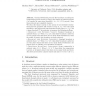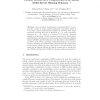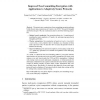101
click to vote
ASIACRYPT
2010
Springer
15 years 2 days ago
2010
Springer
Bit-decomposition, which is proposed by Damg
111
click to vote
EUROCRYPT
1998
Springer
15 years 6 months ago
1998
Springer
Abstract. This paper describes e cient protocols for multi-party computations that are information-theoretically secure against passive attacks. The results presented here apply to...
133
click to vote
EUROCRYPT
2003
Springer
15 years 7 months ago
2003
Springer
Classical distributed protocols like broadcast or multi-party computation provide security as long as the number of malicious players f is bounded by some given threshold t, i.e., ...
112
click to vote
EUROCRYPT
2004
Springer
15 years 7 months ago
2004
Springer
It is well-known that n players connected only by pairwise secure channels can achieve multi-party computation secure against an active adversary if and only if – t < n/2 of t...
122
click to vote
CRYPTO
2004
Springer
15 years 7 months ago
2004
Springer
Unconditionally secure multi-party computations in general, and broadcast in particular, are impossible if any third of the players can be actively corrupted and if no additional i...
101
click to vote
ASIACRYPT
2005
Springer
15 years 7 months ago
2005
Springer
Abstract. As an extension of multi-party computation (MPC), we propose the concept of secure parallel multi-party computation which is to securely compute multi-functions against a...
120
click to vote
ASIACRYPT
2009
Springer
15 years 8 months ago
2009
Springer
We present a new construction of non-committing encryption schemes. Unlike the previous constructions of Canetti et al. (STOC ’96) and of Damg˚ard and Nielsen (Crypto ’00), ou...



